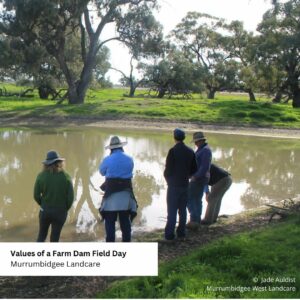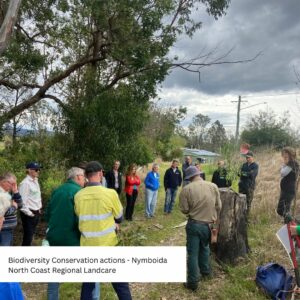Private land conservation really does matter!
– Suzanne Pritchard, LNSW Project Manager
Private land conservation really does matter and Landcarers across NSW are supporting those that are leading the way and encouraging other landholders to follow thanks to the $1.54 million Private Land Conservation Matters (PLCM) contract LNSW is delivering for the Biodiversity Conservation Trust (BCT).
What started out as a partnership between the BCT and LNSW to better understand the shared interests in managing land for biodiversity outcomes has developed into a mutually beneficially arrangement providing resources for 12 host organisations across the state to host 106 events by December 2024.
From multi-partner multi-day forums to online webinars, and every event type in between, how to manage private land to enhance biodiversity outcomes is being talked about by experts, shared in social networking gatherings, understood through citizen science projects and on land that has a one form or another of conservation covenant upon it.
It’s all about protection of Box Gum Grassy Woodlands (BGGW) in the Murray. Landholders will be able to learn about this endangered vegetation type while spotlighting and dining, considering natural capital options, understanding cultural connections or identifying tools and technology to tackle management decision. The BGGW supports productive agriculture based on native pastures, so it’s a win for landholders, native flora and fauna if this diverse ecosystem can be encouraged, expanded and connected across the landscape.
In the north of the state walk & talk field days on covenanted landholdings will see multiple agencies converging to share best practice land conservation techniques and knowledge in dealing with landslips and erosion, threatened species, and property planning. These gatherings are key to strengthening the social connections between landholders, who sometimes feel isolated, with like-minded Landcarers.
Out west big is better and forums are the flavour for bringing landholders together. The combination of large distances and limited time will see a multiday forum held in the western region and a 2-day event focussing on all aspects of utilising fire in the north western region. There will also be field days-a-plenty providing opportunities to get up close and personal with seed, showcasing some trials and demonstration and bringing multiple organisations together to explore and educate how to improve on-farm biodiversity.
The southeast will be utilising the PLCM funding to host roadshows across the region on riparian strategies and bush regeneration techniques. Regional workshops and field days are also planned to cover topics as diverse as koalas, regenerative agriculture, keystone species, fungi and flora, preceded by information sharing webinars so that the theory can be put into on the day. A muster to bring everyone together is in the mix too.
Along the east coast learning opportunities to better understand private land management of feral animals, woody weeds, caring for country, ecological burns for biodiversity, koalas, and fungi will see workshops and field days held. A growing interest in understanding bush regeneration strategies will provide food for thought about the value of retaining and expanding remnant vegetation.
If you’d like to find out more about what’s happening in your region contact your local landcare group, or BCT representative. All regions across the state have something to offer.
Private land conservation, by providing opportunities for landholders and Landcarers to connect and support each other, will greatly contribute to the Global Biodiversity Framework’s 30×30 targets calling for 30% of land under protection by 2030.
The Private Land Conservation Matters program is key to unlocking the potential of landholders to protect biodiversity across the state. LNSW acknowledges the foresight and support of the BCT in resourcing Landcarers to deliver an extensive program of activities for landholders to conserve biodiversity on their property.
March 2024

